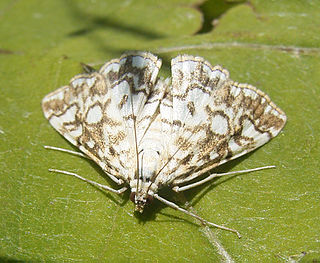
Pyraustinae is a large subfamily of the lepidopteran family Crambidae, the crambid snout moths. It currently includes over 1,400 species, the majority of them tropical but some found in temperate regions including both North America and Europe.

Nola is a genus of moths described by William Elford Leach in 1815. They are the namesake of the subfamily Nolinae and the family Nolidae. This genus occurs worldwide wherever suitable habitat is present.

Spilomelinae is a very species-rich subfamily of the lepidopteran family Crambidae, the crambid snout moths. With 4,132 described species in 340 genera worldwide, it is the most speciose group among pyraloids.

The Thyrididae comprise the family of picture-winged leaf moths. They are the only family in the superfamily Thyridoidea, which sometimes has been included in the Pyraloidea, but this isn't supported by cladistic analysis.

Crambinae is a large subfamily of the lepidopteran family Crambidae, the crambid snout moths. It currently includes over 1,800 species worldwide. The larvae are root feeders or stem borers, mostly on grasses. A few species are pests of sod grasses, maize, sugar cane, rice, and other Poaceae. The monophyly of this group is supported by the structure of the tympanal organs and the phallus attached medially to the juxta.

Agylla is a genus of moths in the subfamily Arctiinae. The genus was erected by Francis Walker in 1854.

Asura is a genus of moths in the subfamily Arctiinae erected by Francis Walker in 1854.

Crambidia is a genus of moths in the family Erebidae. The genus was described by Packard in 1864.

Miltochrista is a genus of moths of the family Erebidae, subfamily Arctiinae. The genus was erected by Jacob Hübner in 1819.

Eoophyla is a genus of moths of the family Crambidae. It was erected by Charles Swinhoe in 1900.
Erupa is a genus of moths of the family Crambidae.

Evergestis is a genus of moths of the family Crambidae described by Jacob Hübner in 1825. A number of species are pests, including the cross-striped cabbageworm, a pest of cole crops such as cabbage.

Glyphodes is a genus of moths of the family Crambidae described by Achille Guenée in 1854.

Loxostege is a genus of moths of the family Crambidae.

Pyrausta is a speciose genus of moths of the family Crambidae. The genus was erected by Franz von Paula Schrank in 1802.

Syllepte is a genus of moths of the family Crambidae.

Acentropinae is a fairly small subfamily of the lepidopteran family Crambidae, the crambid snout moths. Species of this subfamily are exclusively found in wetlands and aquatic habitats.
Crambidia cephalica, the yellow-headed lichen moth, is a moth of the family Erebidae. It was described by Augustus Radcliffe Grote and Coleman Townsend Robinson in 1870. It is found in the central and southern part of the United States, from eastern Nevada, Utah and Arizona to southern Ohio, Tennessee, North Carolina and northern Georgia. The habitat consists of steppes and open forests.

Blavia scoteola is a moth of the subfamily Arctiinae first described by George Hampson in 1900. It is found in the Indian state of Sikkim and Taiwan.
The Lithosiina are a subtribe of lichen moths in the family Erebidae. The taxon was erected by Gustaf Johan Billberg in 1820.
















